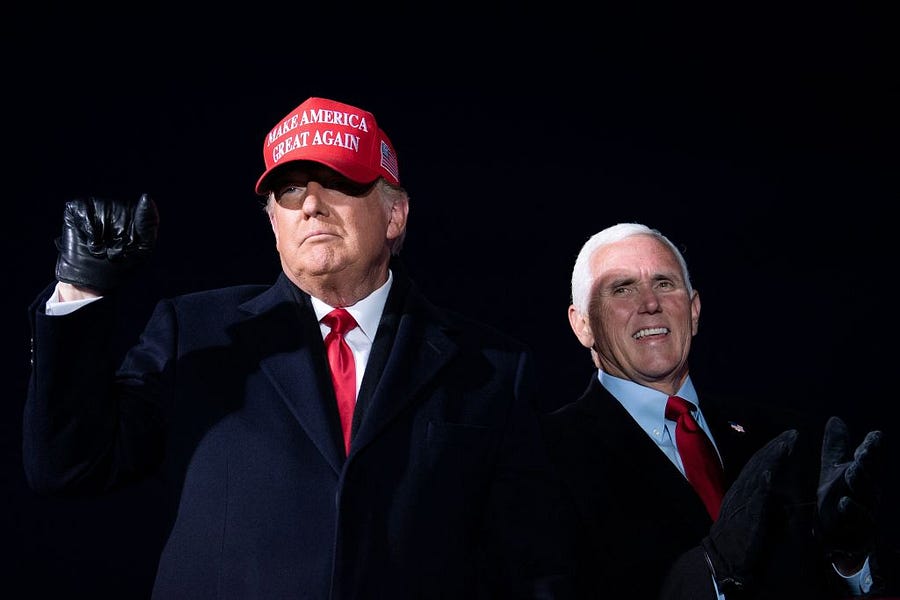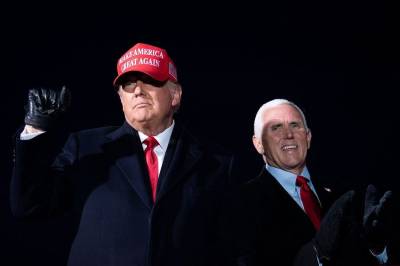When Donald Trump left office on January 20, 2021, many Republican lawmakers quietly hoped the former president’s stranglehold over the GOP would leave too. But that wishful thinking quickly dissipated once Trump made clear he would continue to single out any Republican lawmaker, candidate, or former official who challenges his claim that Biden was not lawfully elected president in 2020.
With the next presidential election already looming after this year’s midterm elections, even some anti-impeachment Republicans are losing patience with the former president’s stolen election narrative, a trend particularly evident in the Senate. “I would like to say [Trump] had great policies, but we’ve got a lot of talent and ability that’s out there and a really deep bench, and I know people are vying for 2024,” Iowa Sen. Joni Ernst—vice chair of the Republican conference—told The Dispatch in a brief interview last week.
Ernst isn’t alone. Trump’s attempt to silence dissenting Republicans has mostly worked for the past year, effectively silencing most GOP lawmakers who privately grumbled about his lingering influence over the party, save the few elected Republicans who voted in favor of Trump’s second impeachment. But a few recent news cycles suggest that the more Trump speaks, the more rank-and-file Republicans are willing to speak out against him.
GOP Sen. Mike Rounds of South Dakota is one such example, having called the 2020 election “as fair as we’ve seen” on ABC News’ This Week in early January. Rounds’ comments prompted the former president to issue a statement calling the senator a “jerk” he will never endorse again.
Like Ernst, Rounds voted to acquit Trump during his second impeachment trial. He did, however, vote to certify the Electoral College results in Pennsylvania and Arizona last year. “We simply looked at the evidence, and we’re going to continue to share, as honest as we can, the fact that Vice President Pence was correct in his analysis,” Rounds told The Dispatch last week.
Senate Republicans’ criticisms of Trump and his stolen election narrative are often delivered with the understanding that Senate Minority Leader Mitch McConnell will come to their defense should Trump clap back with a fiery statement. “Sen. Rounds told the truth,” McConnell said on CNN shortly after Trump issued his statement. McConnell also publicly defended former Vice President Mike Pence weeks later when he pushed back against Trump’s claim that he “could have overturned” Biden’s victory.
Many Republican voters are following suit. In a new Quinnipiac University poll published Wednesday, 52 percent of registered Republicans surveyed said they agree with Pence’s claim that as vice president, he did not have the power to overturn the election results. Only 36 percent of registered Republicans said they side with Trump.
Republican Sen. Bill Cassidy of Louisiana interpreted the poll’s findings as an indicator that the former president’s “credibility” is sinking within his own base, at least as it relates to the stolen election narrative. “It’s safe to say that more people are more aware of the former president, so [Quinnipiac’s polling] at least teases that it may be a negative statement about the former president’s credibility as much as anything else,” said Cassidy, one of seven Republicans senators who voted to convict the former president during his second impeachment trial.
This is all welcome news to the Senate’s top ranking Republican. In stark contrast to House Minority Leader Kevin McCarthy, who has spent the past year ingratiating himself to the former president, McConnell has made clear that he will not shy away from criticizing Trump and his allies. The split became clear earlier this month when both leaders delivered drastically different responses to the Republican National Committee’s (RNC) decision to censure Republican Reps. Liz Cheney and Rep. Adam Kinzinger for agreeing to sit on the House Select Committee to investigate the events of January 6.
“The RNC put out their resolution. I think they have a right to do their resolution and what they wanted,” McCarthy told reporters after the censure vote. His response contrasted sharply with that of McConnell, who said it’s “not the job of the RNC” to “[single] out members of our party who may have different views of the majority.”
Unlike Cheney—who regularly criticized Trump after January 6 while she was still House GOP Conference Chair—McConnell rarely mentions the former president’s name in public. He prefers to air his grievances with fellow Republicans behind closed doors. “In conversations with senators and would-be senators, Mr. McConnell is blunt about the damage he believes Mr. Trump has done to the G.O.P., according to those who have spoken to him,” the New York Times’ Jonathan Martin reported last week. “Privately, he has declared he won’t let unelectable ‘goofballs’ win Republican primaries.”
Others have noticed the difference in tactics. “Liz clearly is being provocative—she’s attempting to illuminate, therefore to shape what the electorate believes,” Cassidy said. “McConnell has taken a middle position: He is not totally responding, but at key points he is weighing in as to what he feels the truth is, and he’s [leaving] it the electorate to decide.”
He’s also leaving it up to Republican lawmakers to draw their own conclusions. A willingness to publicly break with the former president on election-related issues is still far from universal among Republican senators, many of whom still bristle at any mention of the former president. “I don’t comment on this stuff,” Republican Sen. Deb Fischer of Nebraska said Thursday when asked about Wednesday’s Quinnipiac poll.
Part of this aversion to reporter questioning stems from an understanding that criticizing Trump or his stolen election narrative in any way, shape, or form is the surest way to prompt an incendiary statement from the former president. Last week, for example, he called GOP Sen. Susan Collins “atrocious” after she told the New York Times that “no one should be afraid of [him], period.”
It’s no surprise, then, that many Republican lawmakers still dance around questions about the 2020 election. GOP Sen. Mike Braun of Indiana, for example, acknowledges that Pence did not have the power to overturn the election while claiming that public opinion surrounding the Electoral College Act of 1887 is not indicative of Trump’s waning influence on the GOP. “There’s not any one issue I think that defines your point of view about Pence or Trump,” Braun said in a brief interview last week. “So I think it’s much more complicated than that.”
Like other Republican senators eager to pivot from reporters’ questions about the former president, Braun paired his defense of Pence with a repudiation of the House Select Committee on January 6: “The whole issue on January 6, though, is much broader than that, and it’s being politicized by the January 6 Commission, and trying to go beyond holding the ones accountable that brawled with the police or broke into the Capitol.”
Even though anti-Trump sentiment is by no means the dominant thread among Senate Republicans, it’s still growing at a much faster rate in the upper chamber than it is in the House, where 121 of the GOP conference’s then-212 members—or nearly 58 percent—voted to decertify the Electoral College results in at least one state. By contrast, just seven Republican senators did the same.
The lower chamber’s high decertification ratio has discouraged many Trump-skeptical House Republicans from speaking out publicly against the former president. “All he’s done is divide the party,” one House Republican told The Dispatch during the House GOP issues conference last April in Orlando, Florida. “What he’s doing by attacking Republicans who don’t think and act like him is going to ensure that we lose the majority. … It’s infuriating.”
Unlike members of the House, who are constantly on the campaign trail, senators have the cushion of a six-year term. Ernst, Rounds, and Collins, for example, won’t face re-election until 2026, and have more of a buffer from the Republican voters who take issue with their public breaks from the former president.
“Vice President Pence made the right decision,” Rounds said Thursday. “And we owe that message to the American public. We have to provide an answer that we can support.”







Please note that we at The Dispatch hold ourselves, our work, and our commenters to a higher standard than other places on the internet. We welcome comments that foster genuine debate or discussion—including comments critical of us or our work—but responses that include ad hominem attacks on fellow Dispatch members or are intended to stoke fear and anger may be moderated.
With your membership, you only have the ability to comment on The Morning Dispatch articles. Consider upgrading to join the conversation everywhere.